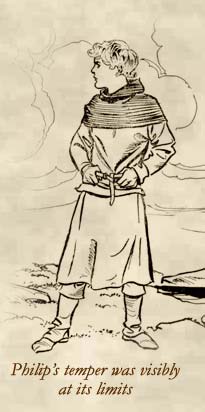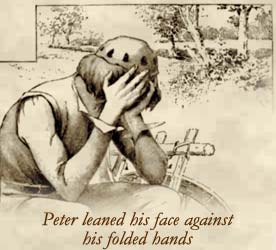Chapter 11
In an instant, Peter remembered how all this had started. Would he help the prince? Now that Peter knew the real reasons for why he was asking, would he do it? The peasant looked down the road and a quiet thought grew louder in his mind.
“Were I to help you,” Peter said slowly, “I would be disobeying my own father.”
“Does your father want you to do what is right?” Philip presumed his answer. “Therefore, do what you know to be the right thing!” It sounded logical and conclusive. But to Peter, relying solely on that common sense left only to the uneducated, there was a contradiction.
“How am I to know what is right?” he asked the prince.
“Use your good judgment,” Philip responded coolly. “God gave you a mind.”
“And commandments to follow,” added the peasant. “The fourth, I believe, being quite clear.”
“Will this not be an honor to both your father and your mother?” asked Philip. “To assist your prince in so noble a task?”
“And is it?” This sudden question caught the prince off guard, whose answer was a silent look. The younger boy sat up straight.
“Is it so noble? You speak of truly serving your father as his own and faithful knight. Seems a strange way for you to show the king your love and fidelity,” Peter continued, despite the indignant look on his friend’s face. “Would a true knight act thus? Repaying your father’s love and sacrifice with rebellion against his own wishes?”
“He didn’t know what this means to me!” protested the prince.
“How do you know?” questioned Peter.
“Well,” Philip said after a pause, “His decision would have been different if he had the faintest idea.”
“How do you know?” repeated the peasant.
“How do you know otherwise?” the royal lad snapped back.
“Because, regardless of what we feel, we have to trust the rules and the people that God gives us to obey.” The young huntsman explained.
“You and your catechism,” the prince scoffed.
“God’s laws rule both the mighty and the lowly, the rich and the poor, the old and the young.”
“I know what the Commandments mean,” retorted Philip.
“Keep your affections to your own family, Peter,” the prince whispered aloud. “My father will be proud of me when he hears of all I’ve gone through to reach him.”
“Your majesty,” Peter began sadly.
“Don’t!” Philip shouted, his voice shaking with rage. “Do not call me that if you have no intention of recognizing me as such!”
“I do,” Peter defended himself.
“Than treat me like I’m actually your prince!”
“How?” the boy said loudly.
“Take me to the other side of that village,” Philip said calmly pointing towards Fishersbrooke.
“No,” Peter said flatly. Philip was not about to give in either.
“Were your father in this position I think he’d do it.”
“If my father were in my position I think he wouldn’t.”
“If he knew what trouble he’d be saving, he would,” said Philip casually. He caught the quizzical look from Peter and continued. “Do you suppose that my soldiers have not already begun looking for me?” he asked. Without waiting for an answer, the prince gave one, “Suppose, on discovering my whereabouts, they also discover the cause for my disappearance and delay.”
Peter smiled. “When they find you, I expect - ”
“Your father to be held responsible.”
Philip’s interruption finished off the peasant’s sentence. The hunter’s son sat motionless; his blood froze in his veins. An icy chill ran through his whole body and grabbed hold of his heart. Peter’s mind quickly grasped what the prince was doing.
“I should hate to see what your father would do when he realizes the ‘misunderstanding’ you’ve caused.” He watched Peter’s face turn from anger to fear.
“Not one of them will escape it, Peter,” he told the peasant. “Do you have any idea what happens to those who kidnap the son of a king?” The boy sank in his seat, apparently having a vivid one.
“It’s not worth the trouble, really,” the prince reasoned, “for a small ride in a cart.” It sounded like a question.
“Not very clearly, it seems.”
“Who are you to stand in judgment over the king’s son?” demanded the prince.
“Who are you to stand in judgment over the king’s decision?”
To this, Peter received no response. Philip’s temper was visibly at its limits, but the peasant nevertheless continued.
“Your father leaves for war and leaves you behind. Were it him thou truly loved and not thyself, my prince, thou would find thy joy in obeying his will and staying at home. ‘If you love Me, you will obey My Commandments’, so saith Our Lord Jesus Christ, Who too was once a boy, like you and me.” Peter stopped. He didn’t intend to do all this. “If I were going to ride you anywhere, it would be back to your castle to stop your poor mother from worry.”

For a long while, neither one spoke. The boy in the cart had lowered his head. Philip was confident, but he refrained from speaking, lest he over-influence the boy’s decision. But he did not know that Someone else was already doing that, because He had been requested to by the peasant’s silent prayers. Peter leaned his face against his folded hands.
At last, the regal boy could wait no longer.
“Well?” he asked, without sounding too impatient.
Peter swallowed and sighed, but said nothing. Finally he raised his head and looked the prince in the eye.
“Forgive me, your highness,” he said, “But my father wants me back by noon.”

